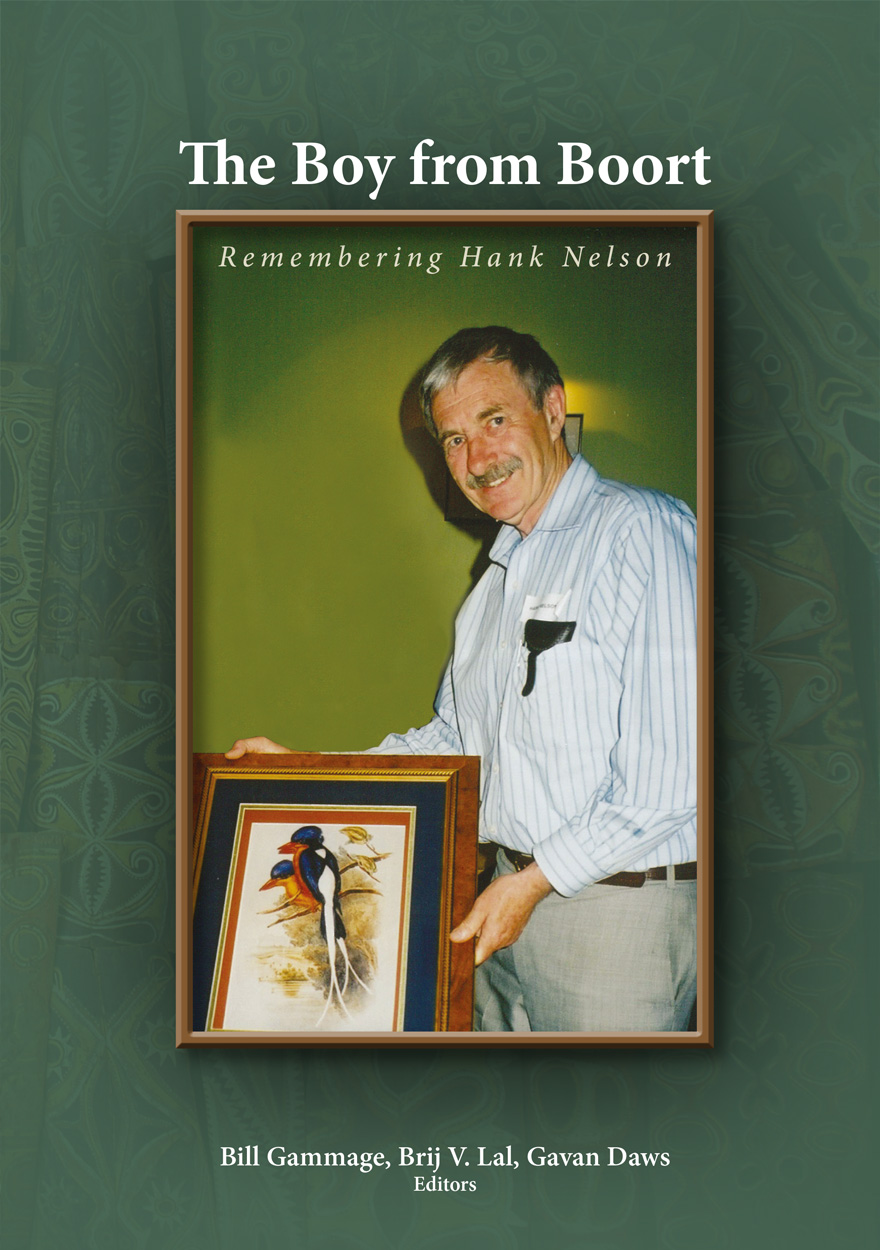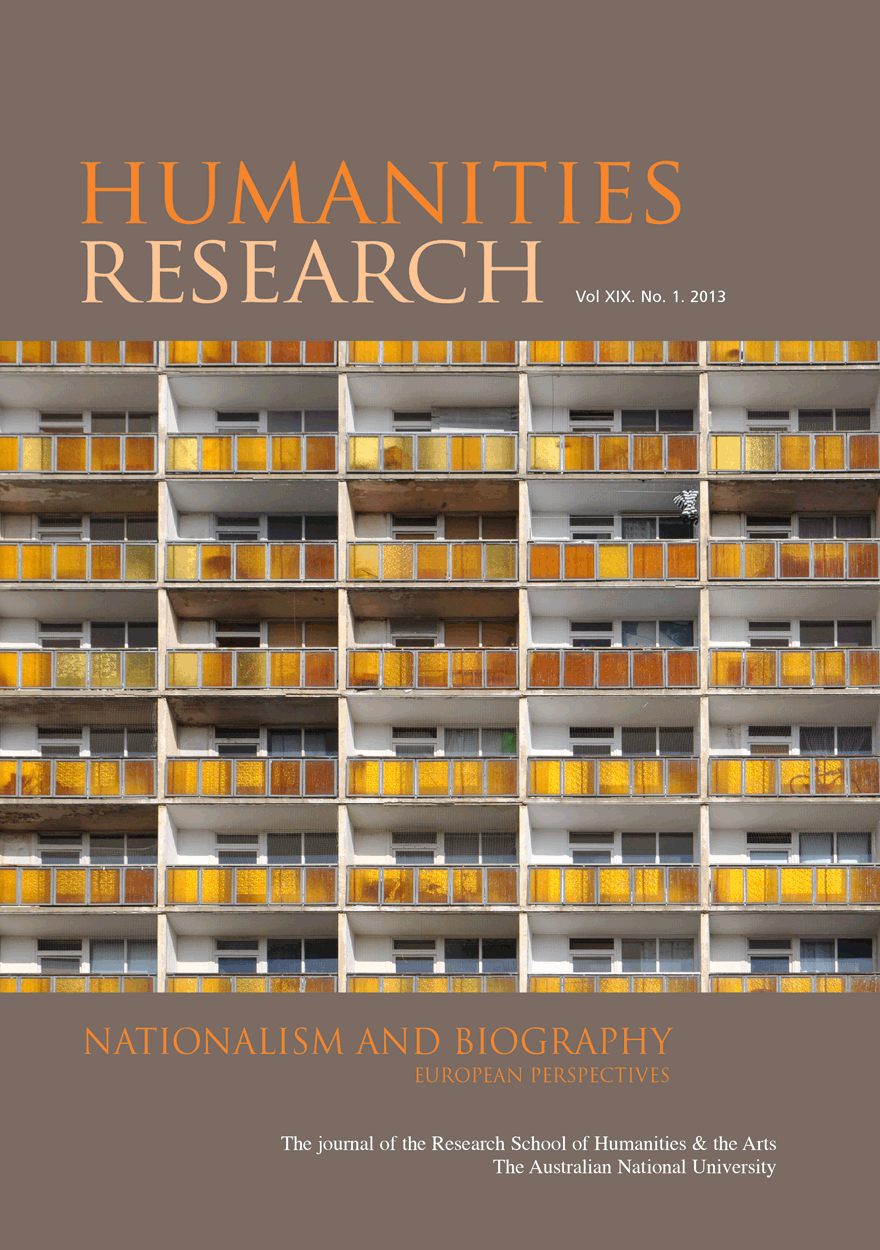Search titles
Displaying results 41 to 50 of 69.

The Boy from Boort »
Remembering Hank Nelson
Edited by: Bill Gammage, Brij V. Lal, Gavan Daws
Publication date: July 2014
Hank Nelson was an academic, film-maker, teacher, graduate supervisor and university administrator. His career at The Australian National University (ANU) spanned almost 40 years of notable accomplishment in expanding and deepening our understanding of the history and politics of Papua New Guinea, the experience of Australian soldiers at war, bush schools and much else. This book is a highly readable tribute to him, written by those who knew him well, including his students, and also contains wide-ranging works by Hank himself. –Professor Stewart Firth, ANU.

Dharmalan Dana »
An Australian Aboriginal man’s 73-year search for the story of his Aboriginal and Indian ancestors
Authored by: George Nelson, Robynne Nelson
Publication date: April 2014
A Yorta Yorta man’s 73-year search for the story of his Aboriginal and Indian ancestors including his Indian Grampa who, as a real mystery man, came to Yorta Yorta country in Australia, from Mauritius, in 1881 and went on to leave an incredible legacy for Aboriginal Australia. This story is written through George Nelson’s eyes, life and experiences, from the time of his earliest memory, to his marriage to his sweetheart Brenda, through to his journey to Mauritius at the age of 73, to the production of this wonderful story in the present.
For more information on Aboriginal History Inc. please visit aboriginalhistory.org.au.

Watriama and Co »
Further Pacific Islands Portraits
Authored by: Hugh Laracy
Publication date: October 2013
Watriama and Co (the title echoes Kipling’s Stalky and Co!) is a collection of biographical essays about people associated with the Pacific Islands. It covers a period of almost a century and a half. However, the individual stories of first-hand experience converge to some extent in various ways so as to present a broadly coherent picture of ‘Pacific History’. In this, politics, economics and religion overlap. So, too, do indigenous cultures and concerns; together with the activities and interests of the Europeans who ventured into the Pacific and who had a profound, widespread and enduring impact there from the nineteenth century, and who also prompted reactions from the Island peoples. Not least significant in this process is the fact that the Europeans generated a ‘paper trail’ through which their stories and those of the Islanders (who also contributed to their written record) can be known. Thus, not only are the subjects of the essays to be encountered personally, and within a contextual kinship, but the way in which the past has shaped the future is clearly discernible. Watriama himself features in various historical narratives. So, too, certain of his confrères in this collection, which is the product of several decades of exploring the Pacific past in archives, by sea, and on foot through most of Oceania.

The ADB's Story »
Edited by: Melanie Nolan, Christine Fernon
Publication date: October 2013
‘The Australian Dictionary of Biography captures the life and times and culture of this country in an absolutely distinctive and irreplaceable way. It is the indispensable record of who we are, and of the characters who have made us what we are. I could not be prouder of ANU’s continuing role as custodian of this crucial part of our national legacy.’
— Professor the Hon. Gareth Evans AC QC, Chancellor, The Australian National University
‘A mature nation needs a literary pantheon of inspiring and instructive life histories, a gallery of all the possibilities of being Australian. The Australian Dictionary of Biography responds to that vital need in our culture. It is a stunning collaborative achievement and I feel so proud that we have such an activity here in Australia—to a great extent it describes and defines Australia.’
— Professor Fiona Stanley AC, Australian of the Year, 2003
‘The Australian Dictionary of Biography is our greatest collective research project in the humanities and a national triumph. We have much to learn from it. The project is continuing to change as we mature nationally, with deeper understanding about the impacts of gender, race, environment, religion, education, language, culture, politics, region and war on what we are and what we may become.’
— The Hon. Dr Barry Jones AO
‘Australia is very fortunate to have a national biographical dictionary that is democratic as well as distinguished, one that represents the rich variety of Australian culture. The Australian Dictionary of Biography gathers together the stories of people from all walks of life, from the outback to the city and from the bush to the parliament. It is a monument of scholarship—and it is for everyone.’
— Dr Dawn Casey PSM
‘Few things are more illuminating than taking a random stroll through a volume of the Australian Dictionary of Biography—new insights into our greatest men and women, chance encounters with people whose exploits are all too often unpardonably overlooked. I first read the ADB with my mother, Coral Lansbury, who wrote four entries. One of her mentors, Bede Nairn, was a prodigious contributor. The Australian story is a story of Australians, no better told than in the ADB.’
— The Hon. Malcolm Turnbull MP
‘I find it difficult to bring to mind more than a handful of comparable enterprises in the fields of biography, history, philology or the social sciences more broadly—anywhere in the world. The status and appeal of the Australian Dictionary of Biography do not lie only in its scale and size. They reside also in the meticulous research, the erudition and scholarship, and the sweat and possibly tears involved in the editorial and publishing process. Its constituent dramatis personae are an eclectic mix of the noble and the notorious, the famous and the largely unsung. The underlying theme of the mosaic is quite clear: nothing less than the making and remaking of Australia.’
— Her Excellency Ms Penelope Wensley AC, Governor of Queensland

Pacific Missionary George Brown 1835–1917 »
Wesleyan Methodist Church
Authored by: Margaret Reeson
Publication date: April 2013
George Brown (1835-1917) was many things during his long life; leader in the Wesleyan Methodist Church in Australasia, explorer, linguist, political activist, apologist for the missionary enterprise, amateur anthropologist, writer, constant traveller, collector of artefacts, photographer and stirrer. He saw himself, at heart, as a missionary. The islands of the Pacific Ocean were the scene of his endeavours, with extended periods lived in Samoa and the New Britain region of today’s Papua New Guinea, followed by repeated visits to Tonga, Fiji, the Milne Bay region of Papua New Guinea and the Solomon Islands. It could be argued that while he was a missionary in the Pacific region he was not a pacific missionary. Brown gained unwanted notoriety for involvement in a violent confrontation at one point in his career, and lived through conflict in many contexts but he also frequently worked as a peace maker. Policies he helped shape on issues such as church union, indigenous leadership, representation by lay people and a wider role for women continue to influence Uniting Church in Australia and churches in the Pacific region. His name is still remembered with honour in several parts of the Pacific. Brown’s marriage to Sarah Lydia Wallis, daughter of pioneer missionaries to New Zealand, was long and rich. Each strengthened the other and they stand side by side in this account.

Edward M. Curr and the Tide of History »
Authored by: Samuel Furphy
Publication date: March 2013
Edward M. Curr (1820–89) was a pastoralist, horse trader, stock inspector, Aboriginal administrator, author and ethnologist. A prominent figure in the history of the Colony of Victoria, he rose to a senior position in the public service and authored several influential books and essays. He is best remembered for his nostalgic memoir, Recollections of Squatting in Victoria (1883), which has become a standard historical source.
This book is the first comprehensive biography of Curr and explores both his life and legacy. In particular, it considers his posthumous influence on the Yorta Yorta native title case (1994–2001), when his written account of the Yorta Yorta ancestors played a key role in the failure of the claim. By exploring Curr’s interactions with Aboriginal people—as a pastoralist and Aboriginal administrator—this book advocates a more nuanced, critical, and historically informed interpretation of Curr’s ethnological writings than was evident in the Yorta Yorta case.
For more information on Aboriginal History Inc. please visit aboriginalhistory.org.au.

Mr Tulsi's Store »
A Fijian journey
Authored by: Brij V. Lal
Publication date: March 2013
Professor Lal has been remarkably successful in combining scholarship with autobiography in Mr Tulsi’s Store. In the essays which cover the author’s childhood and education up to university, diligent scholarship combines with evocative autobiographical details to reveal a philosophical pattern that encompasses the experience of the descendants of all Indian indentured workers everywhere.
Professor Frank Birbalsingh
York University
Canada

Turnings »
Fiji Factions
Authored by: Brij V. Lal
Publication date: March 2013
Through Dr Lal’s refreshingly clear and powerful prose and sharply observed stories, we enter the inner world of Indo-Fijian feeling and aspiration. One universal that emerges with particular clarity in the Indo-Fijian experience is the ceaseless struggle to find community in a changing world, balancing the beauty of ritual and tradition against the transcendent value of education and modern rationality. The volume poses the question of how people draw upon historical memory and immediate circumstances to create a social world, and how that world can be shared with others in multicultural society. The answer seems to lie somewhere between history and poetry, as in Dr Lal’s ‘factions.’
Andrew Arno
University of Hawaii
at Manoa, Honolulu

Humanities Research: Volume XIX No. 1. 2013 »
Nationalism and Biography: European Perspectives
Edited by: Jonathan Hearn, Christian Wicke
Publication date: January 2013
Humanities Research is an internationally peer-reviewed journal published by the Research School of Humanities at The Australian National University. The Research School of Humanities came into existence in January 2007 and consists of the Humanities Research Centre, Centre for Cross-Cultural Research, National Europe Centre and Australian National Dictionary Centre. Launched in 1997, issues are thematic with guest editors and address important and timely topics across all branches of the humanities.
Download for free
Not available for purchase

Chalo Jahaji »
On a journey through indenture in Fiji
Authored by: Brij V. Lal
Publication date: December 2012
“It is a milestone in subaltern studies, a biographical journey penned by a living relic of the indentured experience and a scholar whose thoroughly interdisciplinary approach is a good example for the anthropologist, the sociologist or the economist who wish to see the proper integration of their disciplines in a major historical work.”
— Brinsley Samaroo, University of the West Indies, St Augustine Campus, Trinidad
“Professor Lal has made a most distinguished contribution to scholarship on Indian indentured labour in Fiji. His research is characterised by the use of new methodological approaches to the study of history, and by a comprehensive consideration of both quantitative and literary sources. In beautifully written articles, he has arrived at fresh and novel findings.”
— Ralph Shlomowitz, Flinders University of South Australia
“Professor Lal has produced a body of work which makes him the premier scholar of the Indian diaspora. His meticulous research, the depth of scholarship, the empathy, and the elegance have earned him great respect among Indian diaspora scholars. The themes covered in this book are relevant to other overseas Indian communities; and they are handled with such mastery that his reputation is secured.”
— Clem Seecharan, University of North London
“Brij Lal’s Chalo Jahaji is an intensely personal journey through his life and that of the 60,000 Indians who became girmitiyas in Fiji. The intricate history is measured, but Lal reveals himself and his family in a way historians seldom do. This proud grandson of a girmitiya is equally a proud son of Fiji. Chalo Jahaji is Pacific history at its best: rigorous and critical, informative and involved.”
— Clive Moore, University of Queensland



